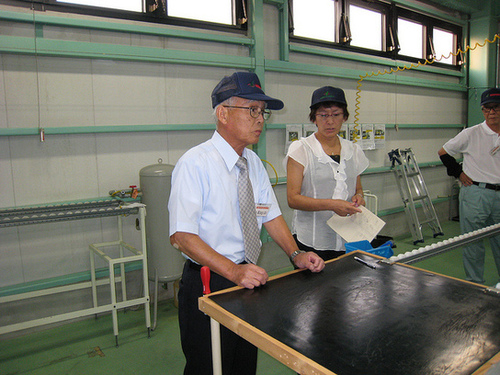Nov 24 2011
Sushi versus Raw Fish: Use foreign words only when you can’t help it
Via Scoop.it – lean manufacturing
James Hereford, COO of the Palo Alto Medical Foundation, prefers to use the original Japanese terms when deploying Lean, arguing that it doesn’t really matter whether words are Japanese or English, and that many Lean terms have no exact translation. While it is true for Kaizen or Kanban, it is not for Gemba, which he gives as an example. Gemba just means “actual place,” nothing more. As a general term, in English, it is not very telling but, in context, it can be replaced with shop floor, lab, operating room, race track, or back office, and there are more urgent things to do to implement Lean than burdening your audience with new, unnecessary words. My main concern in the field is to communicate as effectively and as precisely as possible, and I have found it easier with words my audience already knows, used literally when possible, and metaphorically when not.
People choose words for all sorts of reasons that have nothing to do with conveying a meaning, such as the following:
- Avoiding the emotional or historical baggage of a familiar word. Recycling the vocabulary of a past, failed program makes the new one less likely to succeed.
- Establishing their credentials as members of a group. Using the right jargon is more “professional” than using plain, everyday words. The audience then understands much better the speaker’s position than the meaning of the words.
- Leveraging ambiguity. New words are more likely to be taken to mean different things to different people, making the appearance of agreement easier to establish. This is a common practice of sales people.
Foreign words can serve all of these purposes, which I don’t pursue.
I still think foreign words are OK when:
- They have no local equivalent
- They are short.
- They are easy to pronounce.
Takt is German for musical bar or stroke, as in a four-stroke engine, and I have never seen a reasonable English equivalent to it in takt time. On the other hand, Kevin Hop and I struggled with the Japanese zentenatamadashi, which even Google knows nothing about. Literally, it means “all items sticking out their heads,” and Honda engineer Ray Sanders translated it as “Single-Piece Presentation.” We adopted it because it is accurate, descriptive, easy to remember, and no longer than the original.



Nov 25 2011
Singaporean academics learn TPS at Toyota in Japan
Via Scoop.it – lean manufacturing

This is first-person account by a Singaporean acadenic of a two-day course culminating in a tour of the Tahara assembly line.
Via blog.nus.edu.sg
Share this:
Like this:
By Michel Baudin • Blog clippings 0 • Tags: Lean manufacturing, Toyota